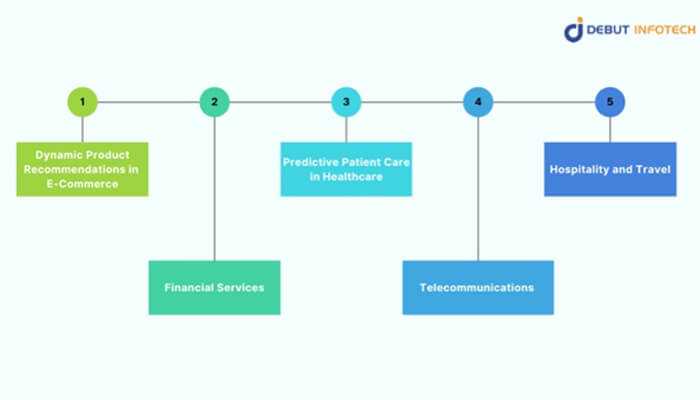A new era in how organizations approach service delivery and client engagement is being ushered in by the transformation of consumer interactions across industries through the use of generative AI integration. Businesses improve the customer experience by using AI to produce insights and reactions that are similar to those of a human. This establishes new standards for individualized service in the modern business environment.
There is a discernible rise in the application of AI technologies to enhance customer experiences on a global scale. The artificial intelligence as a service market was projected to reach $7.79 billion in 2022 and increase at a CAGR (compound annual growth rate) of 37.4% from 2023 to 2030, according to Grand View Research. The importance of AI in revolutionizing customer satisfaction tactics and corporate operations in every industry is demonstrated by this major expansion.
This post highlights how generative AI integration is transforming industries and boosting business growth by enhancing customer experience. It will also showcase how businesses are embracing AI for customer experience.
Understanding Generative AI and Its Role in Customer Experience
Generative AI is a subdivision of artificial intelligence technology. It is capable of creating new content by using data that already exists to inform its models. This technology’s fundamental components generally include machine learning models, natural language processing (NLP), and predictive analytics.
These components enable generative AI to recognize, interpret, and respond to user needs in a sophisticated way. Since generative AI can produce or process personalized information and reactions in real time, it is a uniquely powerful tool for improving consumer experiences.
Generative AI transforms client interactions across various industries, including finance and retail, by automating responses, making personalized recommendations, and enabling more user-friendly and engaging interfaces.
For example, generative AI in e-commerce improves the AI customer journey by using browsing history to forecast products a consumer would like, personalizing the purchasing experience without the need for human participation.
Similar to this, generative AI for customer care apps can comprehend client inquiries and produce precise answers, cutting down on wait times and raising customer satisfaction levels.
Advantages of Including Generative AI in Customer Experience
Let’s examine the transformative advantages that generative AI integration brings to customer experience, revolutionizing how businesses interact with their clientele across various touchpoints:
1. Personalization at Scale
The ability of generative AI to customize each encounter to the unique preferences of each client is essential for improving the AI customer experience. Businesses may effectively address the specific needs of each customer thanks to this exact customization, which promotes customer happiness and loyalty in industries like retail and hospitality.
2. Efficiency and Automation
Response times and overall operational efficiency significantly increase in customer support operations, thanks to the automation made possible by generative AI. Businesses can improve customer experience with artificial intelligence by managing basic questions, freeing up human agents to work on more complicated problems.
3. Data Insights and Decision Making
By utilizing sophisticated analytics, generative artificial intelligence (AI) for customer experience offers a more profound understanding of customer behavior, substantially improving decision-making procedures. Businesses can leverage machine learning to improve customer experience by pinpointing patterns and more efficiently customizing services.
4. Enhanced Interaction with Natural Language Processing
Natural language processing, a feature of generative artificial intelligence, greatly improves communication interfaces, resulting in more seamless and user-friendly digital interactions. This development enhances the quality of customer contacts, making them more satisfying and engaging, in addition to improving the AI customer experience.
Real-World Applications of Generative AI in Enhancing Customer Experience
The application of generative AI has revolutionized customer service in a number of industries by improving overall efficiency through process simplification and personalization.
Enterprises across several industries, including healthcare and banking, are using artificial intelligence to improve customer experience. The following are some well-known case studies, along with the particular tools and technology they use:
1. Dynamic Product Recommendations in E-Commerce
Amazon makes substantial use of generative AI to dynamically recommend products and tailor shopping experiences.
Their machine learning models identify products that users are likely to buy by examining their browsing and purchasing histories. This raises conversion rates while simultaneously enhancing the AI customer journey.
2. Financial Services: Automated Customer Support
Fargo, an AI-powered chatbot used by Wells Fargo, helps consumers with transaction services and account questions. Wells Fargo’s brand new virtual assistant Fargo to be powered by Google Cloud AI.
Deploying generative AI in customer service shortens response times. It raises productivity levels, freeing up human agents to handle more complicated client requests.
3. Predictive Patient Care in Healthcare
Mayo Clinic uses AI to evaluate patient data and forecast health hazards before they become serious. The future of patient care and health management in healthcare is AI. By providing individualized health management plans, this proactive approach to patient care demonstrates how AI can enhance the customer experience while also boosting patient outcomes and satisfaction. What’s more, advances in AI technology allow for physician dictation software to streamline the documentation process, saving doctors valuable time that can be spent with patients.
4. Telecommunications: Improved Client Assistance
By employing virtual operators to handle common questions and grievances, AT&T has integrated generative AI for customer service. The use of AI in customer experience software ensures that customers receive accurate and timely responses while also reducing operating costs.
5. Hospitality and Travel: Tailored Tour Planning
Using AI, Expedia customizes trip suggestions according to customer preferences and historical activity. They increase user satisfaction and engagement by incorporating generative AI and offering highly customized travel options. This deployment highlights the power of AI and customer experience software to reduce operational costs while enhancing service delivery.
These examples underscore how generative AI significantly elevates customer experiences across different sectors, proving its value in today’s digital marketplace.
Challenges and Considerations
Even though generative AI integration has a lot of promise to improve user experiences, there are a few challenges that need to be carefully considered in order to ensure implementation that is morally sound, practical, and efficient.
1. Scalability Challenges
Scalability becomes a major challenge when companies look to apply generative AI across broader segments. Robust infrastructure is necessary to handle large volumes of data and interactions without performance deterioration. There are challenges associated with this requirement, particularly for smaller businesses that might lack the means to grow efficiently.
2. Data Security and Privacy
Since sensitive client data is frequently processed when serving customers, privacy is crucial when using generative AI in customer service. Businesses need to ensure that their AI use complies with international data protection laws like the CCPA and GDPR.
To preserve compliance and confidence, safe data handling procedures and data anonymization are crucial.
3. Technological Integration
It can be difficult to integrate generative AI with current systems; it calls for a great deal of technological alignment and modification. To minimize downtime and increase productivity, businesses must select AI customer experience software that works well with their existing technology infrastructure.
4. Ethical and Regulatory Considerations
Concerns like bias, decision-making transparency, and the acceptable level of automation in customer interactions are brought up by the application of AI in customer experience. Since regulatory frameworks are still catching up to the quick advances in AI technology, many firms find that compliance is a changing target.
Companies that effectively leverage AI improving customer experience can ensure a smoother transition, enhancing both customer satisfaction and operational efficiency.
Overcoming Challenges of Generative AI Integration
Businesses are investing in generative AI integration services and collaborating with generative AI development companies that provide specialized AI development services in order to overcome these obstacles. Through these collaborations, companies can customize AI solutions to meet their unique requirements while upholding legal and ethical obligations.
Future Prospects of Generative AI Integration in Customer Experience
Looking ahead, the generative AI integration trajectory in improving the consumer experience is characterized by tremendous promise and fascinating opportunities. The ongoing development of AI technologies is expected to spur additional improvements in customer service, changing how companies engage with their customers and stay competitive.
1. Predictive Capabilities and Personalization
The future will see an increase in the sophistication of predictive analytics, enabling businesses to anticipate customer needs more accurately and provide solutions proactively. This evolution will be supported by machine learning in customer experience, leveraging data to continuously refine and enhance customer interactions.
2. Role of Continuous Innovation
Staying ahead in the increasingly competitive market requires relentless innovation and the ability to quickly adapt to new technologies.
Companies that explore 10 customer experience implementations of artificial intelligence, investing in generative AI development company services and integrating cutting-edge AI customer experience software, will be better positioned to meet customer expectations and adapt to changing market dynamics.
3. Enhanced Automation and Interaction
As natural language processing and machine learning algorithms become more advanced, we can expect generative AI to deliver even more seamless and engaging customer interactions. These advancements will improve the efficiency of services and enhance the personal touch that customers value, driving loyalty and satisfaction.
Sustainability and Ethical AI Use: Looking forward, the emphasis will also be on developing sustainable AI practices that prioritize ethical considerations. Businesses will need to focus on creating transparent, fair, and accountable AI systems to build trust and ensure compliance with evolving regulations.
Conclusion
Generative AI integration is transforming customer experience by providing personalization, efficiency, and deeper insights. Businesses that understand how AI can improve customer experience will stay competitive and meet growing customer expectations.
For companies looking to enhance their AI customer journey, working with a trusted partner is essential. Debut Infotech provides top-tier AI development services tailored to meet the unique needs of your business.
With expertise in generative AI, we help organizations streamline operations, enhance customer interactions, and unlock new opportunities for growth.
Whether you’re looking to improve customer service, automate processes, or explore innovative AI-driven solutions, our team is ready to guide you every step of the way. Trust Debut Infotech to deliver cutting-edge technology that empowers your business to stay ahead in today’s competitive market. Reach out today and discover how we can help you harness the full power of AI.



